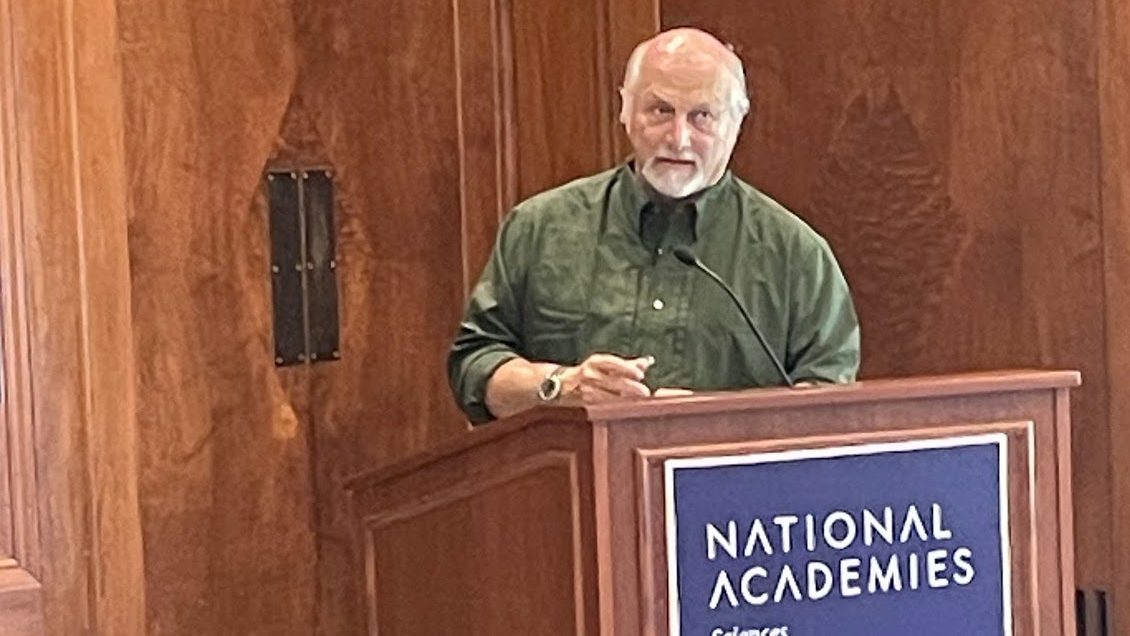A Clemson University professor shared framing remarks about recurrent acute disasters, global environmental change, and sustainability as part of a National Academies of Sciences, Engineering and Medicine workshop on sustainability implications of the Ukraine conflict and global food security.
Gary Machlis, professor of environmental sustainability and a former science adviser to the director of the National Park Service, spoke with colleague Miguel Román about how understanding the relationship between disasters can improve response and future resilience to save lives. Román is senior director and chief scientist at the Leidos Corporation.
Their remarks were part of the National Academies’ Roundtable on Science and Technology for Sustainability held June 1 in Washington, D.C. Attended by scientific and policy leaders, the workshop discussed global food security challenges arising from the Ukraine conflict and possible approaches to addressing these challenges. Other speakers represented The World Bank, the International Monetary Fund, the Center for Climate and Security, and World Central Kitchen.
“The war in Ukraine is tragic on its own, but it is also embedded in a set of interwoven global challenges including climate change, regional droughts, structural food insecurity, civil conflicts, the COVID-19 pandemic, and the consequences of globalization. Our framing remarks were meant to broaden the lens of attention and have the workshop confront the implications of this broader perspective. The response was positive, so perhaps we did our job.”
Gary Machlis
According to the National Academies, Russia and Ukraine account for 29 percent of global wheat exports, 80 percent of the world’s sunflower oil, and an estimated 40 percent of barley. Russia and Belarus are the two largest suppliers of fertilizers around the globe. An early assessment of global consumption of these commodities shows devastating compounding consequences for people and the environment in the short- and long-term.
Other global crises could further complicate this issue, from severe droughts in the western U.S. to supply chain issues with global implications for the U.S. and vulnerable countries in Africa, South America, and the Middle East. Participants discussed short-term responses to the current crisis, opportunities for international collaborations, and how this crisis could impact U.S. national security interests in a changing climate.
The workshop was sponsored by the National Academies’ George and Cynthia Mitchell Endowment for Sustainability and jointly organized by the Policy and Global Affairs Division, Division on Earth and Life Studies, and the Health and Medicine Division.
Machlis has been a part of the Clemson faculty since 2014. He serves in the Department of Parks, Recreation and Tourism Management in the College of Behavioral, Social and Health Sciences with a joint appointment in the Department of Forestry and Environmental Conservation in the College of Agriculture, Forestry and Life Sciences.
About CBSHS
Established in 2016, the Clemson University College of Behavioral, Social and Health Sciences is a 21st-century, land-grant college that combines work in seven schools and departments – Communication; Nursing; Parks, Recreation and Tourism Management; Political Science; Psychology; Public Health Sciences; and Sociology, Anthropology and Criminal Justice – to further its mission in “building people and communities” in South Carolina and beyond.
Get in touch and we will connect you with the author or another expert.
Or email us at news@clemson.edu

